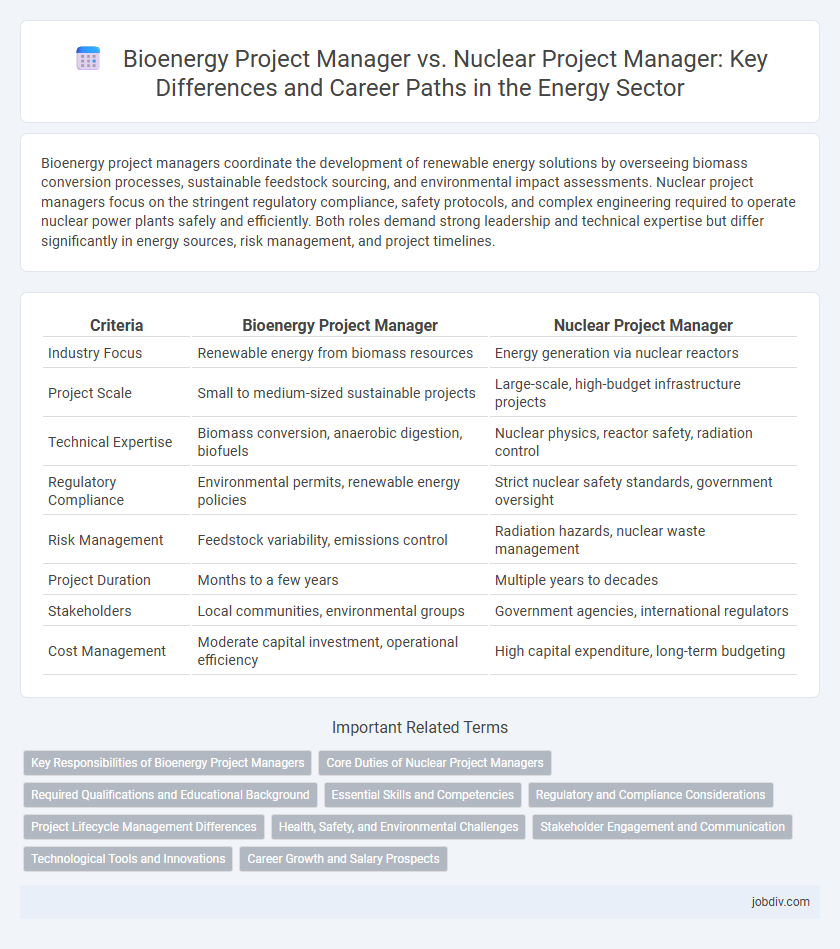Bioenergy project managers coordinate the development of renewable energy solutions by overseeing biomass conversion processes, sustainable feedstock sourcing, and environmental impact assessments. Nuclear project managers focus on the stringent regulatory compliance, safety protocols, and complex engineering required to operate nuclear power plants safely and efficiently. Both roles demand strong leadership and technical expertise but differ significantly in energy sources, risk management, and project timelines.
Table of Comparison
| Criteria | Bioenergy Project Manager | Nuclear Project Manager |
|---|---|---|
| Industry Focus | Renewable energy from biomass resources | Energy generation via nuclear reactors |
| Project Scale | Small to medium-sized sustainable projects | Large-scale, high-budget infrastructure projects |
| Technical Expertise | Biomass conversion, anaerobic digestion, biofuels | Nuclear physics, reactor safety, radiation control |
| Regulatory Compliance | Environmental permits, renewable energy policies | Strict nuclear safety standards, government oversight |
| Risk Management | Feedstock variability, emissions control | Radiation hazards, nuclear waste management |
| Project Duration | Months to a few years | Multiple years to decades |
| Stakeholders | Local communities, environmental groups | Government agencies, international regulators |
| Cost Management | Moderate capital investment, operational efficiency | High capital expenditure, long-term budgeting |
Key Responsibilities of Bioenergy Project Managers
Bioenergy Project Managers oversee the development and implementation of renewable energy projects that utilize organic materials such as biomass, biogas, and biofuels to produce sustainable energy. Their key responsibilities include managing project budgets, coordinating with stakeholders to ensure compliance with environmental regulations, and optimizing supply chains for raw biomass materials. They also monitor project timelines, lead feasibility studies, and implement technologies that maximize energy efficiency and reduce carbon emissions.
Core Duties of Nuclear Project Managers
Nuclear Project Managers oversee the planning, execution, and completion of nuclear energy projects, ensuring compliance with strict safety regulations, managing complex technical teams, and coordinating with regulatory agencies to meet licensing requirements. They focus on risk assessment, radiation protection, and critical maintenance schedules to maintain reactor safety and efficiency. Their core duties also include budget management, stakeholder communication, and detailed project documentation to uphold stringent industry standards and timelines.
Required Qualifications and Educational Background
Bioenergy Project Managers typically require a degree in environmental science, renewable energy, or chemical engineering, with expertise in biomass technologies and sustainability practices. Nuclear Project Managers generally hold advanced degrees in nuclear engineering, physics, or mechanical engineering, alongside certifications in nuclear safety and regulatory compliance. Both roles demand strong project management skills, but nuclear positions emphasize stringent regulatory knowledge due to the complexity and safety risks inherent in nuclear energy projects.
Essential Skills and Competencies
Bioenergy Project Managers require expertise in biomass conversion technologies, renewable energy policies, and lifecycle assessment to optimize sustainable fuel production. Nuclear Project Managers demand strong knowledge of nuclear safety regulations, radiation protection, and reactor operation alongside project scheduling and risk management skills. Both roles emphasize leadership, stakeholder communication, and regulatory compliance but differ significantly in technical specialization and risk mitigation strategies.
Regulatory and Compliance Considerations
Bioenergy Project Managers must navigate complex environmental regulations related to biomass sourcing, emissions, and renewable energy certifications to ensure project compliance. Nuclear Project Managers handle stringent regulatory frameworks involving nuclear safety standards, radioactive waste management, and licensing requirements imposed by agencies such as the Nuclear Regulatory Commission (NRC). Both roles require in-depth knowledge of local, national, and international compliance protocols to mitigate legal risks and facilitate timely project approvals.
Project Lifecycle Management Differences
Bioenergy Project Managers oversee the entire project lifecycle emphasizing biomass sourcing, feedstock variability, and sustainability compliance, while Nuclear Project Managers focus on stringent regulatory approvals, nuclear safety protocols, and radioactive waste management throughout the lifecycle. Bioenergy projects demand flexibility in handling fluctuating supply chains and environmental impact assessments, whereas nuclear projects require detailed risk analyses, extensive stakeholder coordination, and long-term decommissioning strategies. Both roles involve resource allocation and timeline management but differ significantly in risk management complexity and regulatory oversight intensity.
Health, Safety, and Environmental Challenges
Bioenergy Project Managers face significant health risks related to biomass handling, including exposure to dust, emissions, and biological contaminants, while ensuring compliance with air quality regulations and waste management protocols. Nuclear Project Managers must address stringent radiation protection standards, managing radioactive waste disposal and implementing robust emergency response plans to mitigate potential nuclear accidents. Both roles require comprehensive risk assessments and adherence to environmental policies to minimize ecological impact and safeguard worker safety throughout project lifecycles.
Stakeholder Engagement and Communication
Bioenergy project managers excel in engaging diverse local communities and environmental groups, emphasizing sustainable practices and renewable resource benefits, which enhances grassroots support and regulatory approvals. Nuclear project managers prioritize transparent communication with government agencies, regulatory bodies, and safety watchdogs, ensuring compliance with strict safety standards and addressing public concerns about radiation risks effectively. Both roles require tailoring stakeholder interactions to project-specific risks and societal impacts to maintain trust and facilitate project progress.
Technological Tools and Innovations
Bioenergy Project Managers leverage advanced biomass conversion technologies, smart grid integration, and IoT sensors to optimize feedstock processing and energy yield. Nuclear Project Managers utilize cutting-edge reactor design software, digital twin simulations, and robotics for enhanced safety and precision in plant operations. Both roles drive energy innovation through specialized technological tools tailored to their distinct energy sources and regulatory environments.
Career Growth and Salary Prospects
Bioenergy Project Managers typically experience steady career growth due to the expanding renewable energy sector, with average salaries ranging from $85,000 to $120,000 annually. Nuclear Project Managers often command higher salaries, between $100,000 and $150,000, reflecting the complexity and regulatory demands of nuclear energy projects. Both roles offer strong career progression opportunities, but nuclear project management provides greater potential for higher compensation in specialized energy markets.
Bioenergy Project Manager vs Nuclear Project Manager Infographic

 jobdiv.com
jobdiv.com